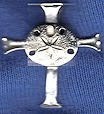Hobart and William Smith Colleges
I am humbled by this honor, and reminded that I stand here only because of the difficult work done by so many women and men before me. Elizabeth Blackwell went through 29 medical schools before she found one that would admit her, albeit grudgingly after what looked like another attempt to keep her and her gender out. I give thanks for the male deans and professors who kept their word, even if given in jest.
An awful lot of women, and many people outside official circles of leadership, have tried and failed to gain entry to many different vocations and opportunities. We remember the ones who prevailed in the face of prejudice or doubt. None of those named trailblazers made their entry wholly on their own. At the same time the remembered ones have continued to inspire others to try.
My own journey has been inspired by Amelia Earhart – for her intrepid courage and mysterious disappearance – and by Antoine de Saint-Exupery and Beryl Markham. I’ve been inspired by the witness of Jeannette Piccard – pioneer balloonist and first woman ordained an Episcopal priest – and other members of her family – Auguste and Jacques, who went exploring in the other direction, into the depths of the sea. I have been inspired by Marie Curie – pioneer in radioactivity, first woman and first double Nobel laureate, and by her younger colleagues – Einstein, Heisenberg, and Bohr. In recent years, I would note the often nameless women who have insisted on peace in their homelands – the market women of Liberia who demanded the warlords make peace, and literally sat down around them until they did. The women of the Niger Delta who shamed the oil companies into doing something about the violence and environmental degradation being visited on their people. I continue to marvel at the women and men of Rwanda and Congo who keep working to heal the war trauma that has so damaged their societies.
I celebrate the remarkable leaders and pioneers of this part of New York, and the outsized witness of Lucretia Mott, Elizabeth Cady Stanton, Harriet Tubman, Susan B. Anthony, and their sisters. It started with a tea party in Waterloo, and had a rather different outcome than the tea party we’re wrestling with right now. That gathering in Seneca Falls was joined by quite a few men, and Frederick Douglass added his voice for greater access and full participation by all human beings. This was about the liberation of the many, rather than special rights and greater power for leaders already inside and in power. There was a powerful tide at work in those tea cups around here in the 1840s.
That tide keeps washing away barriers of gender and race and ethnicity and social class. As our brother Martin put it, “the arc of the moral universe is long, and it bends toward justice.” That arc bends toward the shores of a land where all dwell in peace because there is ultimate justice for all humanity and for all creation. We live in hope for that world, and Hobart and William Smith Colleges are part of encouraging the leaders of today’s tea parties and kaffeeklatsches and symposia to help bring that world to reality. Thank you for your leadership.

